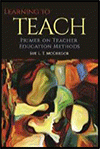
Learning to Teach
Primer on Teacher Education Methods
By:
Sue L. T. McGregor, McGregor Consulting Group
Published 2023
This primer is about learning how to teach. As its name suggests, it provides a basic introduction to what is involved in becoming an effective, efficient, and efficacious educator. The targeted audiences are (a) preservice teachers (PST) (i.e., nonprofessional student teachers enrolled in a university Bachelor of Education degree), (b) early-career (novice) inservice teachers (c) or any educator for that matter who wants to build or bolster their essential foundation for teaching. The primer is unabashedly oriented to a synthesis of the technical (how-to) aspects of teaching because without prowess in these skills, even the most dedicated and committed teacher may not be effective and efficient let alone efficacious. Although teaching is both a science and an art, this primer is about the science of teaching. Other books focus on teaching as inquiry, thinking educators, reflective educators, and the sociocultural/political aspects of teaching.
The book adopts a before-during-after class approach. It addresses how to (a) prepare lessons before a class (learning styles, learning objectives, lesson planning, and learning environments); (b) deliver lessons during a class (instructional strategies, questioning strategies, and classroom management); and (c) evaluate learning after the class (student assessment and evaluation strategies, and teacher self-reflection). This basic tool kit is further underscored with details about the larger constructs of (d) developing courses, modules, and units from which daily lessons emerge. Higher level notions of (e) educational philosophies, (f) curriculum theories and (g) curriculum development approaches are also included to illustrate how they, as the educational context, shape teachers’ pedagogies.
CONTENTS
Preface. CHAPTER 1: Educational Context: Philosophical and Theoretical. CHAPTER 2: Developing Course Outlines, Modules, and Units. CHAPTER 3: Before Class: Learning Styles, Learning Objectives, Lesson Plans, and Learning Environments. CHAPTER 4: During Class: Teaching Strategies, Questioning Strategies, and Classroom Management. CHAPTER 5: After Class: Assessing and Evaluating Student Learning. References. About the Author.
-
Paperback979-8-88730-410-6
Web price: $45.04 (Reg. 52.99)
-
Hardcover979-8-88730-411-3
Web price: $80.74 (Reg. 94.99)
- eBook979-8-88730-412-0

- EDU053000 - EDUCATION: Training & Certification
- EDU029000 - EDUCATION: TEACHING METHODS & MATERIALS: General
- EDU046000 - EDUCATION: Professional Development
-
 A Practical Guide to Exemplary Professional Development Schools
A Practical Guide to Exemplary Professional Development Schools
-
 Beyond Single Stories
Changing Narratives for a Changing World
Beyond Single Stories
Changing Narratives for a Changing World
-
 Contemporary Perspectives on English as a Medium of Instruction
Contemporary Perspectives on English as a Medium of Instruction
-
 Cultivating Democratic Literacy Through the Arts
Guiding Preservice Teachers Towards Innovative Learning Spaces in ELA Classrooms
Cultivating Democratic Literacy Through the Arts
Guiding Preservice Teachers Towards Innovative Learning Spaces in ELA Classrooms
-
 Faculty Learning Communities
Working Towards a More Equitable, Just, and Antiracist Future in Higher Education
Faculty Learning Communities
Working Towards a More Equitable, Just, and Antiracist Future in Higher Education
-
 The Handbook for Aspiring Higher Education Leaders
The Handbook for Aspiring Higher Education Leaders
-
 The Undivided Life
Faculty of Color Bringing Our Whole Selves to the Academy
The Undivided Life
Faculty of Color Bringing Our Whole Selves to the Academy

